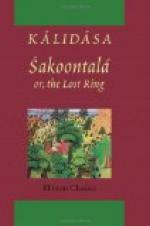and even Milton uses the same freedom once or twice in every page.
The poetical merit of Kalidasa’s ‘[S’]akoontala’ is so universally admitted that any remarks on this head would be superfluous. I will merely observe that, in the opinion of learned natives, the Fourth Act, which describes the departure of [S’]akoontala from the hermitage, contains the most obvious beauties; and that no one can read this Act, nor indeed any part of the play, without being struck with the richness and elevation of its author’s genius, the exuberance and glow of his fancy, his ardent love of the beautiful, his deep sympathy with Nature and Nature’s loveliest scenes, his profound knowledge of the human heart, his delicate appreciation of its most refined feelings, his familiarity with its conflicting sentiments and emotions. But in proportion to the acknowledged excellence of Kalidasa’s composition, and in proportion to my own increasing admiration of its beauties, is the diffidence I feel lest I may have failed to infuse any of the poetry of the original into the present version. Translation of poetry must, at the best, resemble the process of pouring a highly volatile and evanescent spirit from one receptacle into another. The original fluid will always suffer a certain amount of waste and evaporation.
The English reader will at least be inclined to wonder at the analogies which a thoroughly Eastern play offers to our own dramatic compositions written many centuries later. The dexterity with which the plot is arranged and conducted, the ingenuity with which the incidents are connected, the skill with which the characters are delineated and contrasted with each other, the boldness and felicity of the diction, are scarcely unworthy of the great dramatists of European countries. Nor does the parallel fail in the management of the business of the stage, in minute directions to the actors, and various scenic artifices. The asides and aparts, the exits and the entrances, the manner, attitude, and gait of the speakers, the tone of voice with which they are to deliver themselves, the tears, the smiles, and the laughter, are as regularly indicated as in a modern drama.
In reference to the constitution and structure of the play here translated, a few general remarks on the dramatic system of the Hindus may be needed[5].
Dramatic poetry is said to have been invented by the sage Bharata, who lived at a very remote period of Indian history, and was the author of a system of music. The drama of these early times was probably nothing more than the Indian Nach-dance (Nautch) of the present day. It was a species of rude pantomime, in which dancing and movements of the body were accompanied by mute gestures of the hands and face, or by singing and music. Subsequently, dialogue was added, and the art of theatrical representation was brought to great perfection. Elaborate treatises were written which laid down minute regulations for the




